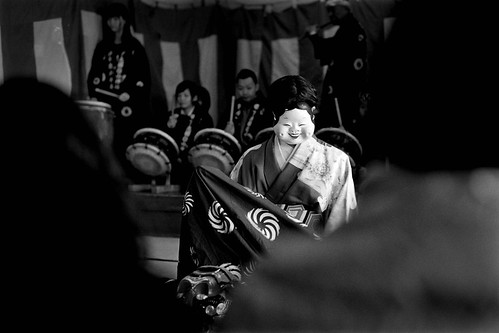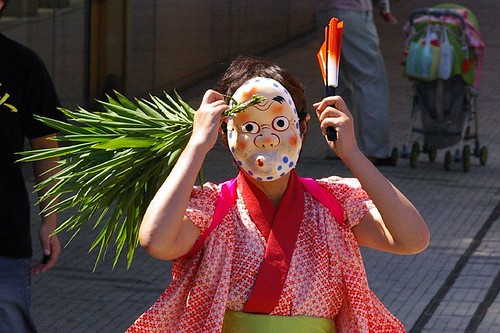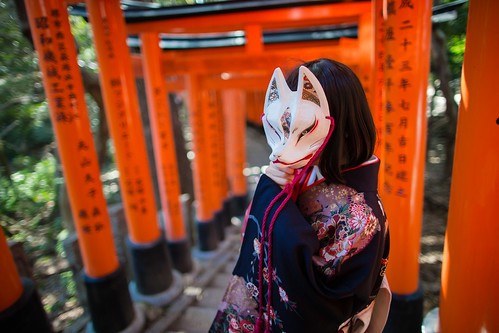What are the types of Japanese masks out there?
Stick around.
In this quick guide, you’ll learn about the 8+ types of Japanese masks, their significance in the Japanese culture, and how they look like.
About Masks in Japanese Culture
Since ancient times, it has been believed that wearing a mask inhabits the deities of spirits and animal spirits.
So, masks have been used in religious ceremonies and traditional ceremonies around the world.
Masks were also used in theater.
For example, Japanese Traditional Performance “Nohgaku” (能楽) is a performing art that has been performed for over 600 years since the Muromachi (室町) period, and includes Noh (能) and Kyogen (狂言).
- Kyogen: A type of traditional Japanese comic theater
- Noh: Traditional Japanese (drama) theater that communicates Buddhist themes
In Noh (能), the performers wear Noh masks with the accompaniment of chants and music, and the story unfolds with stylized and extremely simple movements.
Characteristics of Noh masks are called as “omote”(面). It is said that there are about 250 types of Noh masks and 60 basic types, ranging from scary to humorous.
By the way, if you’re looking for Japanese masks for sale, check out Amazon – click the images below.
 Kitsune/Fox Mask Kitsune/Fox Mask |
 Hannya Oni Mask Hannya Oni Mask |
 Hyottoko Mask Hyottoko Mask |
 Samurai Mask Half Face Samurai Mask Half Face |
So, let’s look at some common types of Japanese noh masks, starting with…
“Hannya” (般若)
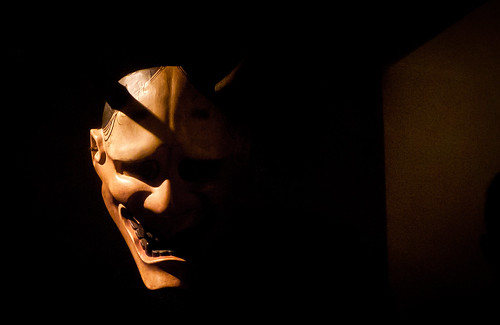
The Hannya mask represents a jealous female demon.
The mask has a leering mouth, sharp teeth, metallic eyes, and two sharp devil-like horns. In “The Tale of Genji” (源氏物語), there is a section where “Aoi no Ue” (葵の上), the wife of “Hikaru Genji” (光源氏) was possessed by a vengeful spirit born out of jealousy of “Rokujou no Miyasudokoro” (六条御息所). The possessed woman came to be called “Hannya” (般若).
This is what you may consider as a “Japanese demon mask.”
In my opinion, this is one of the coolest looking types of Japanese masks here. At least, from a design perspective.
“Ko Omote” (小面)
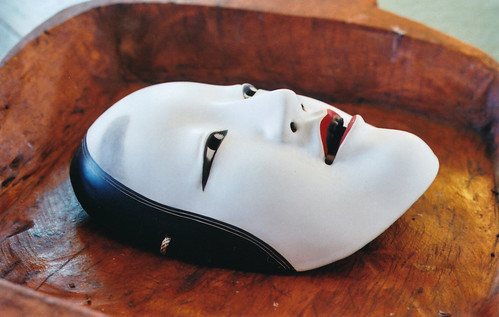
One of the representative masks of Noh, “Ko Omote”(小面)translates as “small face”.
This mask represents “cute, young and beautiful girl”, a female around 16-17 years old. It is modeled after a princess of a noble family from the Heian (平安) period to the Kamakura (鎌倉) period, who plucked her eyebrows, drew high eyebrows on her forehead, dyed her teeth black, and parted her hair at the center.
“Chujō” (中将)
This mask is used for the spirits of nobles and Heike (平家) nobles (male) . Modeled after Ariwara no Narihira (在原業平), a 9th century Japanese poet and courtier, the mask is used in plays for the protagonist of a tragedy. It has slender facial features with eyebrows drawn in and a sorrowful expression that raises its eyebrows.
“Dōji” (童子)
Dōji (童子) is a boy’s mask. However, in Noh, this mask does not represent just a boy, but also an incarnation of a god or a hermit who retains eternal youth. In the Noh plays, the Dōji (童子) is a mysterious figure who has a long black head that is as tall as the performer.
“Okina” (翁)
“Okina” (翁) means old man.
The mask is considered particularly sacred and has been at times treated as the embodiment of a god who brings longevity and prosperity to their descendants. It is used only in the ceremonial Noh play “Okina” (翁), which is the most prestigious, on an occasion such as New Year’s or stage opening performances.
Apart from Japanese Noh masks, we have some traditional and interesting types of Japanese masks.
“Okame” (おかめ)
The Okame is a mask of a woman with a wide forehead, a low nose, and a round face. Normally its cheeks are swollen and red brushed. In Japan, it has been believed that a fat and happy looking woman would ward off evil spirits.
“Hyottoko” (ひょっとこ)
The “Hyottoko” is a mask of a man with a pointed mouth and a frightened expression. It is often said that the name “Hyottoko”(ひょっとこ) originated from “hi” (ひ), which means “fire,” and “otoko”(男), which means “man.” After all, he is the god of fire who brings good luck to families and deceased people. The mask ca be seen in Dengaku(田楽), a Japanese traditional dance, where the wearer plays as a clown-like figure.
“Kitsune men” (狐面)
Kitsune means fox in Japanese…
And men can mean mask or face.
The “Kitsune men” is a fox mask and is used in traditional Kagura (神楽) – dances and songs performed to worship the gods. At Inari shrines, a fox is often considered auspicious as it is enshrined as a messenger of the gods. In addition, the fox mask is said to bring benefits such as a bountiful harvest, prosperous business, and family safety. Foxes were said to be worshiped as gods because they protected the rice fields from rats.
Festival stalls in Japan almost always sell masks. If you happen to visit any local festivals, check out the mask selling stalls. You can find many masks from anime and cartoon characters as well as the above mentioned masks for sure!
Conclusion
Now you know a bit about the types of Japanese masks out there…
Their significance within Japanese culture…
And how they look like!
Which type of Japanese masks are your favorite? Personally, I go for the hannya, although it is suprising to know that it represents a jealous female demon. Design-wise, it is cool.
Anyway, leave a comment.
I read them all!
– Team IJ



